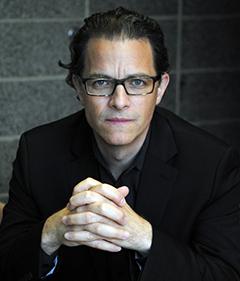Columbia Center for Contemporary Critical Thought Launches
New Center Will Be Directed By Critical Thought Professor Bernard E. Harcourt, Who Has Challenged Conventional Wisdom on Practices including Mass Incarceration, Free Market Economics, Broken Windows Policing, and Racial Profiling
New York, October 7, 2014—The roots of critical thought go back at least to French Renaissance writer Michel de Montaigne, but a new Columbia Law School and Columbia Faculty of Arts and Sciences initiative will apply the age-old interdisciplinary approach to a host of modern issues, including the use of surveillance as a mode of government power in the age of Big Data.
The initiative, launched this fall by Columbia Law School Professor Bernard E. Harcourt, is called the Columbia Center for Contemporary Critical Thought and will bring together scholars and students who are engaged in developing novel ways of understanding how legal and scientific knowledge is produced and organized.
| Professor Bernard E. Harcourt |
Embraced by philosophers ranging from Nietzsche, Freud, and Marx to Michel Foucault, critical thought takes place at the intersection of law, social sciences, and the humanities.
Harcourt, Isidor and Seville Sulzbacher Professor of Law, joined the Columbia Law School faculty in July. He describes critical thought as a “logic of suspicion” that attempts to dismantle commonly held beliefs by demonstrating how they have been constructed over time. In his own work, Harcourt has used critical thought and empirical data to argue against racial profiling, broken windows policing, and mass incarceration, to question free market economics, to reexamine asylums and institutionalization in this country and abroad, and to explore the idea of political disobedience. His latest work, including a book forthcoming in 2015, critically examines government and corporate surveillance in the context of social networking sites such as Facebook and Twitter—or what he calls “digital security” and its effects on governing, exchanging, and policing.
“The mission of the Columbia Center for Contemporary Critical Thought is to nourish, explore, encourage, and support critical reexamination of the received wisdom of our time,” Harcourt said. “The task of contemporary critical thought is to question and challenge the authority of established truths and falsehoods, to challenge their empirical foundations, and to engage in forms of practice that test the limits of knowledge.”
Under Harcourt’s direction, the center will provide opportunities for students to analyze how critical thought can be applied to real-world scenarios. Next semester, Harcourt and University of Chicago Professor W.J.T. Mitchell will co-teach Spectacle and Surveillance, a seminar that will examine surveillance in a time of near-total information storage and retrieval. The course is partially funded by a grant from the Mellon Centre for Disciplinary Innovation.
The center also will host short-term seminars with renowned contemporary theorists, sponsor lectures and workshops, organize book events and colloquia, and create a reading group for faculty members and graduate students across Columbia University. The first one-week seminar will take place in November with François Robert Ewald, the recently retired chair of insurance studies at the Conservatoire National des Arts et Métiers (Paris) and Foucault’s primary assistant from 1976 to 1984. A spring seminar will feature Renata Salecl, a philosopher whose recent work has focused on the anxiety produced by choice.
Another dimension of the center will allow students to participate actively in litigation and policy initiatives addressing such criminal justice practices as capital punishment and prison terms of life imprisonment without parole, with the goal of tying practice to critical thought.
“Critical thought bridges philosophy, political theory, sociology and social theory, anthropology, classics, law, art criticism, and cultural studies,” Harcourt said. “It represents an epistemological approach that is reflected in a wide range of disciplines and approaches.”
Harcourt is the author of several books, including Occupy: Three Inquiries in Disobedience with Michael Taussig and W.J.T. Mitchell (University of Chicago Press 2013) and The Illusion of Free Markets: Punishment and the Myth of Natural Order(Harvard University Press 2011). He is also the editor of Foucault’s 1973 Collège de France lectures, La Société punitive (Gallimard 2013) and co-editor of Foucault’s 1981 Louvain lectures, Wrong-Doing, Truth-Telling (University of Chicago Press 2014).His scholarship has examined the sociology of punishment and penal law and procedure, including through pioneering empirical research on asylums and prisons. In addition to his work as a scholar, Harcourt represents death row inmates pro bono and has served on human rights missions in South Africa and Guatemala.
Before joining Columbia Law School, Harcourt served as the Julius Kreeger Professor of Law and Political Science at The University of Chicago, where he was the chairman of the political science department. He also holds a chair at the École des Hautes Études en Sciences Sociales in Paris.
